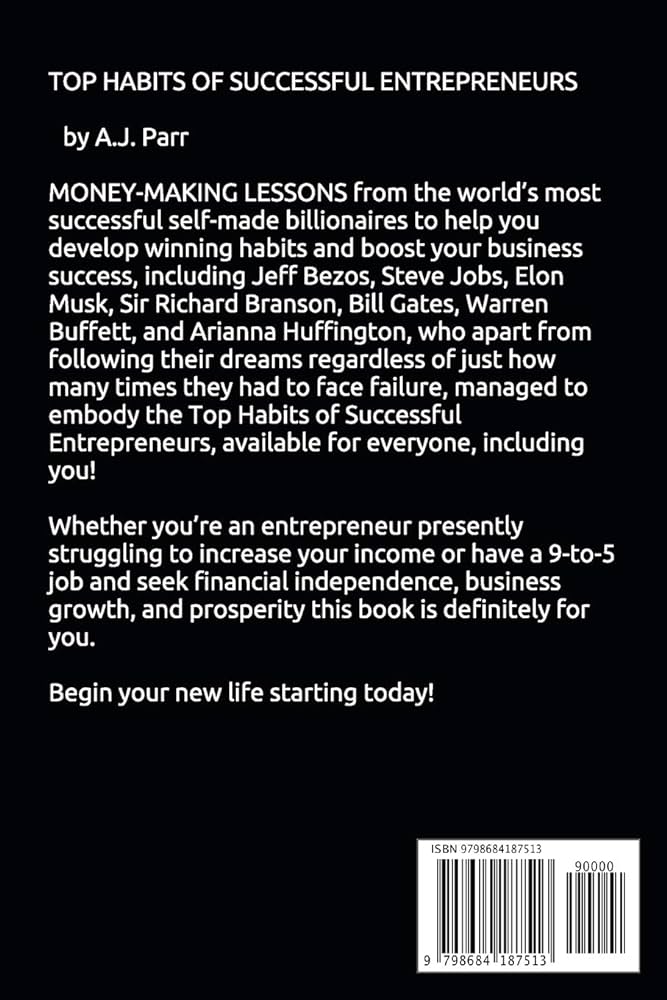9 Best Books for Entrepreneurs to Boost Your Business Success
Embarking on an entrepreneurial journey is both thrilling and challenging. Whether you’re launching a startup or scaling an existing business, having the right knowledge can make all the difference. Books offer invaluable insights from those who’ve been there and done that, providing you with strategies, inspiration, and practical advice.
In this article, you’ll discover nine must-read books that every entrepreneur should have on their shelf. These books cover a range of topics, from mastering business fundamentals to fostering innovation and personal growth. Dive in and find your next great read to help you navigate the exciting world of entrepreneurship.
Start With the Basics: “The Lean Startup” by Eric Ries
If you’re new to entrepreneurship, you can’t go wrong with “The Lean Startup” by Eric Ries. This book provides fundamental principles to build a successful, sustainable startup.
Key Takeaways for Entrepreneurs
- Test Ideas Early
Validate your concepts with real customers before full-scale development. Save time and resources. - Iterate Quickly
Develop, test, and refine products in rapid cycles. Make improvements swiftly based on feedback. - Pivot When Needed
Change direction when your initial plan doesn’t work. Adapt and find the right strategy. - Measure Progress
Use actionable metrics. Focus on meaningful data instead of vanity metrics.
- Emphasizes Learning
Shift from planning to learning. View failure as a learning opportunity. - Promotes Efficiency
Prioritize work that creates value for customers. Strip away unnecessary efforts. - Encourages Flexibility
Adapt your vision based on validated learning. Maintain flexibility in your approach.
By following these principles, “The Lean Startup” helps you create products that customers truly want while minimizing wasted effort.
Embark on the Financial Journey: “Rich Dad Poor Dad” by Robert Kiyosaki
Insights on Financial Literacy
“Rich Dad Poor Dad” is a cornerstone in financial education. Kiyosaki contrasts his two father figures—the “rich dad” who’s his friend’s father and instills entrepreneurial wisdom, and the “poor dad,” his biological father who follows traditional views on money. He introduces concepts like assets and liabilities, emphasizing the importance of acquiring assets that generate income. The book challenges conventional beliefs about wealth and offers alternative strategies for achieving financial independence.
Why It’s a Must-Read for Entrepreneurs
For aspiring entrepreneurs, this book is essential. It shifts your perspective on money management and underscores the importance of financial literacy in building a successful business. Kiyosaki’s lessons encourage you to think differently about investments, risk-taking, and the path to financial freedom. By understanding and applying these principles, you can make informed decisions that lead to sustained entrepreneurial success.
Understand Modern Marketing: “Influence: The Psychology of Persuasion” by Robert Cialdini
Robert Cialdini’s “Influence: The Psychology of Persuasion” is a must-read for entrepreneurs looking to master modern marketing techniques. This classic book delves into the psychology behind why people say “yes” and how you can apply these principles in your business.
Understanding Consumer Behavior
Learn about the six principles of persuasion: reciprocity, commitment and consistency, social proof, authority, liking, and scarcity. Cialdini breaks down each principle using real-world examples to show how they influence consumer decisions. By understanding these psychological triggers, you’ll be better equipped to design marketing strategies that resonate with your target audience and drive sales.
Applications in Entrepreneurial Ventures
Apply Cialdini’s principles to various aspects of your business. Use reciprocity by offering free trials or valuable content to build goodwill. Leverage social proof by showcasing customer testimonials and case studies. Enhance your authority by establishing expertise through thought leadership content. These practical applications help you create more effective marketing campaigns, improve customer engagement, and ultimately grow your business.
Mastering Productivity: “The 4-Hour Workweek” by Timothy Ferriss
Timothy Ferriss’s “The 4-Hour Workweek” has become a must-read for entrepreneurs looking to maximize productivity and minimize wasted time.
Redefining Productivity for Entrepreneurs
Ferriss challenges traditional productivity models. Instead of working longer hours, he advocates for smart work strategies. By focusing on high-impact tasks, you can achieve more in less time. Outsourcing, automating, and eliminating unnecessary activities are key principles Ferriss emphasizes. These changes can significantly boost your entrepreneurial efficiency.
Critical Lessons from the Book
Ferriss introduces the concept of the “New Rich.” This involves designing a lifestyle that prioritizes freedom and experiences. He stresses the importance of mini-retirements, questioning the deferral of happiness until traditional retirement age. The book also delves into the Pareto Principle (80/20 rule), suggesting that 80% of your outcomes come from 20% of your efforts. By identifying and focusing on these high-value activities, you streamline your business processes effectively.
Dive Into the Entrepreneur’s Mind: “Mindset: The New Psychology of Success” by Carol S. Dweck
“Mindset: The New Psychology of Success” by Carol S. Dweck provides invaluable insights into how the way you think can significantly impact your success as an entrepreneur. This book dives deep into the psychological aspects that shape your business journey.
Growth Mindset vs. Fixed Mindset
Understand the profound difference between a growth mindset and a fixed mindset. Dweck explains that a growth mindset embraces challenges, persists in the face of setbacks, and sees effort as a path to mastery. In contrast, a fixed mindset avoids challenges, gives up easily, and feels threatened by others’ success. Entrepreneurs with a growth mindset are more likely to innovate, adapt to market changes, and continuously improve, essential traits for long-term success.
How Mindset Affects Entrepreneurship
Mindset shapes your entrepreneurial journey. Dweck’s research reveals that those with a growth mindset are more resilient, ambitious, and open to learning from failures. This attitude is crucial when facing inevitable business obstacles. By adopting a growth mindset, you’ll view challenges as opportunities to learn and grow, leading to better decision-making, increased creativity, and a higher likelihood of achieving your business goals.
Learn From the Best: “Steve Jobs” by Walter Isaacson
Dive into the life and mind of one of the most influential entrepreneurs of our time with “Steve Jobs” by Walter Isaacson. This book offers valuable lessons in innovation and leadership, drawing from Jobs’ extraordinary career.
Lessons in Innovation and Leadership
Discover how Steve Jobs revolutionized multiple industries by focusing on simplicity and excellence. Jobs’ relentless pursuit of perfection and his ability to blend art with technology led to the creation of iconic products like the iPhone, iPad, and MacBook. Learn about his approach to product design, emphasizing user experience and aesthetics. His innovative mindset teaches you to think differently and challenge the status quo, essential traits for any entrepreneur.
How Steve Jobs’ Principles Can Guide Modern Entrepreneurs
Embrace Jobs’ principles to gain a competitive edge in today’s market. Prioritize customer needs above all else, ensuring every product and service provides exceptional value. Foster a culture of innovation within your team, encouraging creativity and bold thinking. Jobs’ emphasis on building a strong, cohesive team highlights the importance of collaboration and hiring the right talent. Apply these principles to navigate the entrepreneurial landscape with vision and resolve.
Embrace Innovation: “Zero to One: Notes on Startups, or How to Build the Future” by Peter Thiel
Peter Thiel’s “Zero to One” offers a fresh perspective on innovation and entrepreneurship.
The Philosophy of Monopoly and Competition
Thiel posits that creating a monopoly is the ultimate goal for startups. Monopolies, unlike fierce competition, allow for sustained profitability and innovation. He points to companies like Google, which dominate their markets and continuously evolve. Avoid competing in crowded spaces. Instead, find and dominate a niche where you can set your startup apart.
Strategies for Future Entrepreneurs
Thiel provides actionable strategies to achieve business success. Start by questioning conventional wisdom to uncover unique insights. Focus on developing a product that is 10x better than existing alternatives. Cultivate a long-term vision and remain persistent through setbacks. Thiel’s insistence on thinking big and planning meticulously can guide you through building a revolutionary startup.
Sustainable Success: “The 7 Habits of Highly Effective People” by Stephen R. Covey
Stephen R. Covey’s classic provides timeless principles for personal and professional improvement. For entrepreneurs, it’s a roadmap to sustainable success.
Cultivating Effective Habits for Success
Covey outlines seven habits crucial for achieving effectiveness. Begin with being proactive—taking initiative and responsibility. Focus on what you can control rather than what you can’t. Establish clear goals with Begin with the End in Mind—visualize your end goals to guide decision-making. Prioritize tasks by Putting First Things First—concentrate on urgent and important activities. Think Win-Win—aim for mutually beneficial solutions in all interactions. Understand others first (Seek First to Understand, Then to Be Understood) before expressing your viewpoint. Foster teamwork and innovation through Synergize—combine strengths to create solutions. Lastly, Sharpen the Saw—invest in self-renewal to maintain and enhance your capabilities.
How These Habits Apply to Entrepreneurial Success
Proactivity helps you seize opportunities before competitors. Goal visualization ensures your actions align with your business vision. Prioritizing key tasks increases productivity and efficient resource use. Win-Win strategies build lasting partnerships and customer loyalty. Effective communication strengthens team dynamics and client relations. Harnessing collective strengths fosters innovative solutions, keeping you ahead in the market. Continuous self-improvement ensures your skills and mindset adapt to evolving business challenges. These habits collectively drive long-term entrepreneurial success.
Leading Change: “Leading Change” by John Kotter
“Leading Change” by John Kotter is a comprehensive guide on change management, highly relevant for entrepreneurs. Kotter’s eight-step process helps navigate and implement successful changes effectively.
Understanding Change Management
Grasping change management principles is crucial. Kotter’s model starts with creating urgency, a critical factor in initiating change. Establishing a guiding coalition ensures you have the right people on board. Crafting a vision and strategy gives direction. Communicating this vision is necessary for buy-in. Removing obstacles smooths the transition process. Generating short-term wins keeps momentum. Consolidating gains helps integrate new approaches, while anchoring changes in corporate culture makes them sustainable.
Applying Concepts to Your Business
Implementing Kotter’s concepts can transform your business. Start by identifying situations that require change and create a sense of urgency around them. Form a strong team to lead the change. Develop and share a clear vision. Ensure the entire organization understands and supports the change. Remove barriers and empower employees. Celebrate small successes to maintain motivation. Build on these wins for continued improvements. Finally, solidify these changes within your company’s culture to prevent regression.
Conclusion
Diving into these nine books can significantly enhance your entrepreneurial journey. Each one offers unique insights and actionable strategies that can help you navigate the complex world of business. Whether you’re just starting out or looking to scale your existing venture these books provide the knowledge and inspiration you need to succeed. From mastering effective habits to implementing change management processes you’ll find invaluable lessons that can transform your approach to entrepreneurship. Invest time in these reads and watch your entrepreneurial skills soar.






